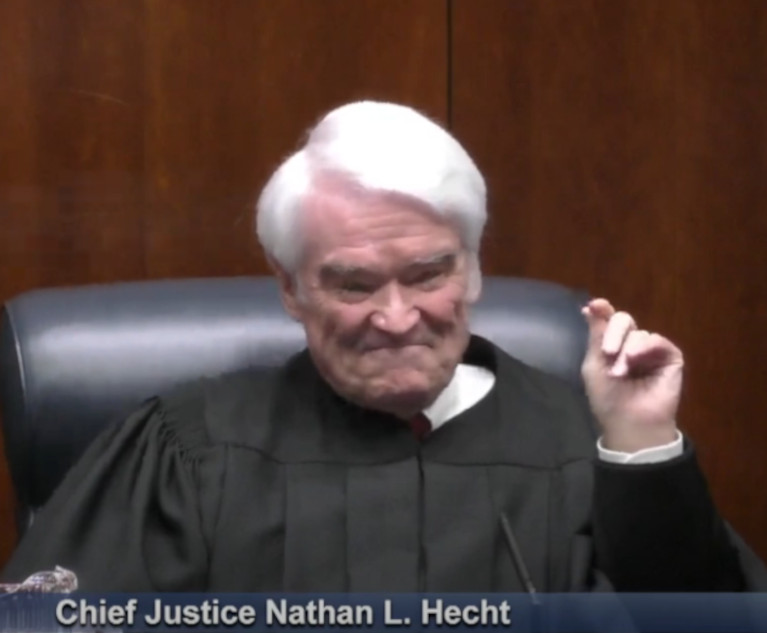Republican Party Won't Let Exonerated Judge Run on Texas Ballot
Suzanne Wooten got her law license back in 2017 following her exoneration of nine felonies from a 2011 wrongful conviction. Running for judge again, the local Republican Party claimed a 2012 to 2017 law license suspension makes her ineligible for the ballot. Wooten counters that as a matter of law, that suspension never took place.
December 09, 2019 at 03:37 PM
4 minute read
 Suzanne H. Wooten. Photo: Mark Graham
Suzanne H. Wooten. Photo: Mark Graham
An exonerated former Texas judge is asking Dallas' Fifth Court of Appeals to step in and grant emergency relief that would order the Republican Party to place her on the ballot for the 2020 primary election.
But the party argues Suzanne Wooten's does not meet the qualification criteria, because her suspension meant she wasn't practicing for the prerequisite period before her exoneration.
Being wrongfully convicted of nine felonies in 2011 ruined Wooten's life and livelihood. She resigned as a district judge and her law license was suspended — until her exoneration in 2017 promised to redeem her.
With her law license back, Wooten is taking a chance to run for Collin County's 401st District Court.
But the Texas Constitution requires judge candidates to have been practicing law for four years before an election. In Wooten's case, there's a question of whether her exoneration negates the suspension of her law license suspension.
Claiming the local Republican Party wrongly disqualified her from the March 2020 Republican Primary ballot, Wooten has asked Dallas' Fifth Court of Appeals for relief and assistance in getting on the primary ballot.
"She was completely exonerated by the district court, and reinstated and restored, as though she never lost her law license at all," Wooten's attorney Scott Palmer said. "We think this is a case of first impression."
Wooten's Dec. 6 petition for writ of mandamus in the case, In Re Suzanne Wooten, explained that in a Nov. 25 letter, Collin County Republican Party Chairman Mark Reid wrote to Wooten that public records required him to declare her ineligible for the ballot. Reid wrote that Wooten's law license was suspended between October 2012 and June 2017. The Texas Constitution would require Wooten to have been a practicing lawyer for the four years preceding the election, which means 2016 to 2020, he wrote.
Wooten argued that a court in May 2017 exonerated her and vacated her nine felony convictions as though they never existed or had any legal effect. The court's order also said any legal disabilities that flowed from those convictions were void and ordered to be set aside.
Wooten claimed that her law license suspension was one of those "legal disabilities" that resulted from the void convictions. The Texas Board of Disciplinary Appeals terminated the suspension in June 2017, the petition said.
"The suspension was voided by judicial order, and thus as a matter of law never existed," Wooten claimed.
Currently, the State Bar of Texas shows that Wooten has no public disciplinary history, the petition added.
The law at issue is Texas Elections Code Sec. 145.003(f), which sets out how to find that a candidate is unqualified for office. If the facts of that ineligibility are not determined by a judge, then they must be conclusively established by another public record.
Wooten argues that the public record doesn't conclusively show she's ineligible for the ballot.
However, in a Dec. 9 response, Reid and the Collin County Republican Party maintained that Wooten doesn't meet the Constitution's requirements to be a judge and that Reid relied on records that do conclusively establish her ineligibility.
"As a matter of law, an attorney whose license is suspended cannot be a 'practicing lawyer' because the attorney is not a member in good standing of the bar and any practice of law activity is prohibited," the response said.
Lenahan Law Firm partner Tom Cowart of Dallas didn't return a call or email seeking comment before deadline.
Related stories:
How the Justice System Severely Failed One of its Own
Wrongfully Convicted District Judge Alleges Malicious Prosecution in Lawsuit
Wrongfully Convicted Ex-Judge Wins Ruling in Malicious Prosecution Lawsuit
'Finish What I Started': Wrongfully Convicted Texas Judge Makes Another Run for Bench
This content has been archived. It is available through our partners, LexisNexis® and Bloomberg Law.
To view this content, please continue to their sites.
Not a Lexis Subscriber?
Subscribe Now
Not a Bloomberg Law Subscriber?
Subscribe Now
NOT FOR REPRINT
© 2025 ALM Global, LLC, All Rights Reserved. Request academic re-use from www.copyright.com. All other uses, submit a request to [email protected]. For more information visit Asset & Logo Licensing.
You Might Like
View All
ExxonMobil Sues California AG Bonta, Environmental Groups for Advanced Recycling 'Smear Campaign'

2 Judges: Meet the New Chief Justice and the GC Who Just Rose to the Bench
3 minute read

Trending Stories
- 1Court Rejects San Francisco's Challenge to Robotaxi Licenses
- 2'Be Prepared and Practice': Paul Hastings' Michelle Reed Breaks Down Firm's First SEC Cybersecurity Incident Disclosure Report
- 3Lina Khan Gives Up the Gavel After Contentious 4 Years as FTC Chair
- 4Allstate Is Using Cell Phone Data to Raise Prices, Attorney General Claims
- 5Epiq Announces AI Discovery Assistant, Initially Developed by Laer AI, With Help From Sullivan & Cromwell
Who Got The Work
J. Brugh Lower of Gibbons has entered an appearance for industrial equipment supplier Devco Corporation in a pending trademark infringement lawsuit. The suit, accusing the defendant of selling knock-off Graco products, was filed Dec. 18 in New Jersey District Court by Rivkin Radler on behalf of Graco Inc. and Graco Minnesota. The case, assigned to U.S. District Judge Zahid N. Quraishi, is 3:24-cv-11294, Graco Inc. et al v. Devco Corporation.
Who Got The Work
Rebecca Maller-Stein and Kent A. Yalowitz of Arnold & Porter Kaye Scholer have entered their appearances for Hanaco Venture Capital and its executives, Lior Prosor and David Frankel, in a pending securities lawsuit. The action, filed on Dec. 24 in New York Southern District Court by Zell, Aron & Co. on behalf of Goldeneye Advisors, accuses the defendants of negligently and fraudulently managing the plaintiff's $1 million investment. The case, assigned to U.S. District Judge Vernon S. Broderick, is 1:24-cv-09918, Goldeneye Advisors, LLC v. Hanaco Venture Capital, Ltd. et al.
Who Got The Work
Attorneys from A&O Shearman has stepped in as defense counsel for Toronto-Dominion Bank and other defendants in a pending securities class action. The suit, filed Dec. 11 in New York Southern District Court by Bleichmar Fonti & Auld, accuses the defendants of concealing the bank's 'pervasive' deficiencies in regards to its compliance with the Bank Secrecy Act and the quality of its anti-money laundering controls. The case, assigned to U.S. District Judge Arun Subramanian, is 1:24-cv-09445, Gonzalez v. The Toronto-Dominion Bank et al.
Who Got The Work
Crown Castle International, a Pennsylvania company providing shared communications infrastructure, has turned to Luke D. Wolf of Gordon Rees Scully Mansukhani to fend off a pending breach-of-contract lawsuit. The court action, filed Nov. 25 in Michigan Eastern District Court by Hooper Hathaway PC on behalf of The Town Residences LLC, accuses Crown Castle of failing to transfer approximately $30,000 in utility payments from T-Mobile in breach of a roof-top lease and assignment agreement. The case, assigned to U.S. District Judge Susan K. Declercq, is 2:24-cv-13131, The Town Residences LLC v. T-Mobile US, Inc. et al.
Who Got The Work
Wilfred P. Coronato and Daniel M. Schwartz of McCarter & English have stepped in as defense counsel to Electrolux Home Products Inc. in a pending product liability lawsuit. The court action, filed Nov. 26 in New York Eastern District Court by Poulos Lopiccolo PC and Nagel Rice LLP on behalf of David Stern, alleges that the defendant's refrigerators’ drawers and shelving repeatedly break and fall apart within months after purchase. The case, assigned to U.S. District Judge Joan M. Azrack, is 2:24-cv-08204, Stern v. Electrolux Home Products, Inc.
Featured Firms
Law Offices of Gary Martin Hays & Associates, P.C.
(470) 294-1674
Law Offices of Mark E. Salomone
(857) 444-6468
Smith & Hassler
(713) 739-1250






